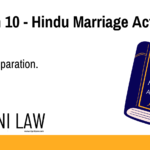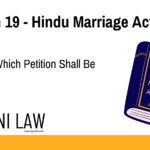Code:
(1) Notwithstanding anything contained in this Act, it shall not be competent for any court to entertain any petition for dissolution of a marriage by a decree of divorce, unless at the date of the presentation of the petition one year has elapsed since the date of the marriage:
Provided that the court may, upon application made to it in accordance with such rules as may be made by the High Court in that behalf, allow a petition to be presented before one year has elapsed since the date of the marriage on the ground that the case is one of exceptional hardship to the petitioner or of exceptional depravity on the part of the respondent.
But if it appears to the court at the hearing of the petition that the petitioner obtained leave to present the petition by any misrepresentation or concealment of the nature of the case, the court may, if it pronounces a decree, do so subject to the condition that the decree shall not have effect until after the expiry of one year from the date of the marriage or may dismiss the petition without prejudice to any petition which may be brought after the expiration of the said one year upon the same or substantially the same facts as those alleged in support of the petition so dismissed.
(2) In disposing of any application under this section for leave to present a petition for divorce before the expiration of one year from the date of the marriage, the court shall have regard to the interests of any children of the marriage and to the question whether there is a reasonable probability of a reconciliation between the parties before the expiration of the said one year.
Explanation:
Section 14 of the Hindu Marriage Act, 1955, sets a minimum time limit of one year for filing a divorce petition. This means that no court can entertain a divorce petition unless one year has passed since the date of the marriage. This one-year period is known as the ‘cooling-off period’.
However, the law allows for exceptions to this rule. The court can grant permission to file a divorce petition before the expiry of one year if it’s established that the case involves:
- Exceptional Hardship to the Petitioner: The petitioner is facing extreme hardship due to the marriage.
- Exceptional Depravity of the Respondent: The respondent’s behavior is extremely depraved, making it impossible to continue the marriage.
The court, while considering such exceptions, will prioritize the interests of any children involved in the marriage and the possibility of reconciliation between the parties before the one-year period ends.
Illustration: section 14 – hindu marriage act
Imagine a situation where a woman is trapped in an abusive marriage. She experiences severe physical and emotional abuse from her husband. In such a case, she could apply to the court for permission to file a divorce petition before. It should be filed within the completion of one year. The court, recognizing the extreme hardship faced by the woman, could grant permission for filing the petition.
Common Questions and Answers:
Q: Can I file for divorce immediately after my marriage?
A: No, you cannot file for divorce immediately after your marriage. You must wait for at least one year from the date of the marriage to file a divorce petition.
Q: What if I am facing domestic violence? Can I file for divorce before one year?
A: Yes, you can file for divorce before one year if you are facing domestic violence. The court might consider your case as one of “exceptional hardship” and grant permission to file the petition.
Q: What happens if I lie to the court to get permission to file for divorce before one year?
A: If the court finds out that you misrepresented the facts to obtain permission, it can pronounce the divorce decree. But make it effective after one year from the date of the marriage. Alternatively, the court can dismiss your petition.
Certainly! Below is a concise and SEO-optimized conclusion for Section 14 of the Hindu Marriage Act, 1955 — No Petition for Divorce to Be Presented Within One Year of Marriage:
Conclusion
Section 14 of the Hindu Marriage Act serves as a safeguard to discourage hasty divorces and promotes the stability of marital relationships. By mandating that no divorce petition can be filed within the first year of marriage, the law encourages couples to attempt reconciliation and work through early marital challenges. However, in cases of extreme hardship or exceptional depravity, the provision also allows courts the discretion to permit divorce petitions before the one-year period. This balanced approach ensures that the institution of marriage is protected while also recognizing situations where continued cohabitation may be harmful.
For more insights into matrimonial laws and expert legal guidance, visit ApniLaw.








